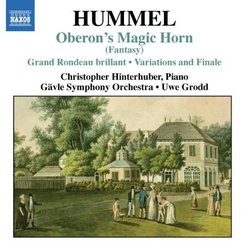| All Artists: Johann Nepomuk Hummel, Uwe Grodd, Gävle Symphony Orchestra, Christopher Hinterhuber Title: Hummel: Oberon's Magic Horn; Grand Rondeau brillant; Variations and Finale Members Wishing: 0 Total Copies: 0 Label: Naxos Original Release Date: 1/1/2007 Re-Release Date: 11/20/2007 Genre: Classical Styles: Forms & Genres, Concertos, Historical Periods, Classical (c.1770-1830), Instruments, Keyboard, Symphonies Number of Discs: 1 SwapaCD Credits: 1 UPC: 747313284528 |
Search - Johann Nepomuk Hummel, Uwe Grodd, Gävle Symphony Orchestra :: Hummel: Oberon's Magic Horn; Grand Rondeau brillant; Variations and Finale
 | Johann Nepomuk Hummel, Uwe Grodd, Gävle Symphony Orchestra Hummel: Oberon's Magic Horn; Grand Rondeau brillant; Variations and Finale Genre: Classical |
Larger Image |
CD Details |
CD ReviewsBrilliant and Engaging Music D. A Wend | Buffalo Grove, IL USA | 04/03/2008 (5 out of 5 stars) "Hummel has truly become quite popular since the mid-1980's when Stephen Hough recorded the A minor and B minor piano concerti. Nowadays, the CD catalogue has a wide variety of his works to choose from. This CD contains some spectacular works for piano and orchestra magnificently played by Christopher Hinterhauberand the Gavie Symphony Orchestra. The fir work - Le retour de Londres - is a brilliant and colorful work loaded with some fantastic writing for the piano. The piece was first performed in London in 1830 and was greeted with a great deal of enthusiasm. The Variations and Finale (1830) has a lovely introduction the leads into the theme followed by variations noted for the fluid and improvisatory approach taken by Hummel that also allowed him to elaborate more fully on the theme. The soloist has some brilliant passage work and the orchestral parts provide an excellent accompaniment. Oberons Zauberhorn was published in 1831 with the music actually based to a small extent on Weber's opera. It was Hummel's intention to use the title to give a structure to his own music rather than writing a paraphrase of Weber. The work has a dramatic fanfare-like introduction with horn calls interspersed with the piano and is recalled at the end of the piece. The music is highly descriptive suggesting action and probably could be considered Hummel's musical reaction to Oberon. The storm sequence at the conclusion of the music is a delight; very colorful and descriptive of a real storm. The Variations in F major was written in 1820 and is, for Hummel, a typically brilliant series of variations. The music begins with the piano and orchestra engaged in a playful dialogue followed by variations of a more somber tone then returning to the beginning tempo, with a brilliant cadenza that takes the music to the final variation and conclusion. Listening to this music one is amazed by Hummel's inventive and brilliant music, so beautiful and expressive. The recording is nicely engineered I only wish that the pieces had more extensive cues so one could pick out the individual variations for example. This is a marvelous disc and anyone interested in the Romantic period will enjoy this disc. " Hummel's "Oberon's Magic Horn" cd James L. Vendeland | Cleveland, Ohio USA | 05/07/2008 (5 out of 5 stars) "If you are like me and enjoy Romantic Piano Concertos of the 1st half of the 19th century, then you are in for a treat with this budget cd produced by Naxos of some rare piano works of Johann Nepomuk Hummel. There are 4 selections on this disc. The 1st is the "Grand Rondeau brillant" and it most certainly lives up to its name. Upon hearing it, I am reminded of some of John Field's concertos and sonatas! There is a long (over 3 minute) introduction but the melody is well worth waiting for. There are also elements of Beethoven in this work with crashing crescendos and I even detected some Chopin-like embellishments.
"Oberon's Zauberhorn" is program music based on Weber's opera Oberon. To me this work did sound very Weberish and reminded me of his Concertstuck for Piano! The "Variations in F major" is something that I could picture Mozart writing and it is a charming composition. In my opinion, the "Variations & Finale in B flat major" was the weakest selection of the four and just didn't inspire me as the 3 others had. I would hardily recommend this work to lovers of piano and orchestral works of the early 19th century. The sound quality is quite good! I think this disc is well worth the money. Jim Vendeland Cleveland" |
